
Expert Insights: How Vets Choose the Best Senior Dog Food
As our beloved furry friends age, their dietary needs change just like ours do. Senior dogs require a different approach to nutrition than their younger counterparts, due to factors such as health concerns, changes in appetite and digestion, and evolving nutritional needs.
In this article, we will explore the key differences between senior dog food and regular dog food. We’ll also discuss what to look for and avoid in senior dog food, and how veterinarians go about choosing the best senior dog food for their patients. Whether you’re a pet parent of a senior dog or a veterinarian looking for expert insights, this article has something valuable for everyone.
So, let’s dive in and ensure our senior furry friends are getting the best nutrition possible.
What Makes Senior Dog Food Different from Regular Dog Food?
Understanding the distinctions between senior dog food and regular dog food is crucial for addressing the unique nutritional needs, health concerns, and changes in appetite and digestion of aging dogs.
As dogs age, their bodies require different nutritional support to maintain their overall health and well-being.
Senior dog food is specially formulated to accommodate the decreased metabolism, joint support, and potential dental issues that older dogs may experience. The higher levels of certain vitamins and minerals, such as antioxidants and omega-3 fatty acids, in senior dog food can help support cognitive function and reduce inflammation.
Senior dog food often contains fewer calories to help prevent obesity and its associated health problems in older dogs.
Nutritional Needs of Senior Dogs
Meeting the nutritional needs of senior dogs requires a comprehensive understanding of their specific dietary requirements, including the importance of quality ingredients and balanced nutrition to support their aging bodies.
As dogs age, their metabolism slows down, and they may require fewer calories while still needing essential nutrients to maintain their health.
Protein becomes even more critical to maintain muscle mass, and older dogs may benefit from joint-supporting ingredients like glucosamine and omega-3 fatty acids.
Senior dogs may have specific medical conditions that require dietary adjustments, such as kidney disease or dental issues.
Tailoring their diet to address these needs is crucial for their overall well-being and longevity.
Health Concerns of Senior Dogs
The health concerns of senior dogs encompass a range of age-related issues, emphasizing the importance of tailored senior dog food to address their specific needs, promote pet health, and support comprehensive senior dog care.
As dogs age, they experience a decline in physical abilities and increased susceptibility to various health conditions such as arthritis, dental issues, and cognitive dysfunction. Senior dog food formulations are designed to accommodate these challenges by providing joint support, dental care, and cognitive function support through specific nutrients and ingredients. These dietary adjustments play a crucial role in ensuring that aging dogs receive the appropriate nutrition to maintain their overall health and vitality during their senior years.
Changes in Appetite and Digestion
The changes in appetite and digestion experienced by senior dogs necessitate a holistic approach to dietary recommendations. This emphasizes tailored senior dog food formulations that address specific dietary considerations for optimal health and wellness.
As dogs age, their metabolism may slow down, impacting their appetites and digestive capabilities. Therefore, it becomes crucial to focus on nutrient-dense, easy-to-digest ingredients in their food to support their overall well-being.
Specific senior dog food formulations can cater to their changing nutritional needs, such as increased fiber for digestive health and joint-supporting ingredients for mobility. By addressing these unique requirements, pet owners can ensure that their aging companions receive the essential nourishment they need to thrive in their later years.
What to Look for in Senior Dog Food?
When selecting senior dog food, it’s important to prioritize high-quality protein sources, healthy fats, and ingredients that support joint health, digestive well-being, and natural and whole food ingredients.
As dogs age, their diet should consist of high-quality protein for muscle maintenance and healthy fats for energy. Ingredients like glucosamine and chondroitin are essential for promoting joint health, while prebiotics and probiotics help maintain digestive balance. Choosing natural and whole food ingredients ensures your senior dog receives necessary nutrients without artificial additives, promoting their overall well-being and vitality.
High-Quality Protein Sources
In senior dog food, prioritizing high-quality protein sources is pivotal for ensuring the nutritional value, ingredient analysis, and alignment with age-appropriate dietary requirements, facilitating optimal pet food selection for elderly dogs.
These protein sources play a crucial role in supporting senior dogs’ muscle maintenance, joint health, and overall mobility. High-quality proteins promote better digestion and nutrient absorption, which are vital for older dogs with potentially decreased digestive efficiency.
Incorporating these protein sources ensures that senior dogs receive essential amino acids, contributing to their overall well-being and longevity. Therefore, selecting senior dog food with high-quality protein sources is imperative for meeting their specific nutritional needs.
Healthy Fats and Omega-3 Fatty Acids
Senior dog food enriched with healthy fats and omega-3 fatty acids plays a vital role in promoting canine wellness, addressing dietary restrictions, and aligning with expert guidance for optimal senior dog care.
As senior dogs age, it’s important to ensure they receive the necessary nutrients to maintain their overall health. This includes incorporating healthy fats and omega-3 fatty acids into their diet, which can help with joint pain and mobility issues commonly seen in older dogs.
Expert guidance can help determine the proper balance and quantity of these nutrients, taking into account individual dietary needs and any specific health conditions. By providing these essential nutrients, senior dogs can enjoy a shiny coat, reduced inflammation, and improved cognitive function, leading to a longer and better quality of life.
Joint Support Ingredients
In senior dog food formulations, the inclusion of joint support ingredients is essential for addressing age-related health issues, meeting the dietary needs of elderly dogs, and aligning with the standards set by the pet industry for optimal pet nutrition.
Ingredients like glucosamine, chondroitin, and omega-3 fatty acids are essential for maintaining joint health, reducing inflammation, and supporting mobility in aging dogs.
The pet industry has recognized the significance of these ingredients in senior dog food, resulting in a rise in specialized formulations that align with pet nutrition standards. This ensures that senior dogs receive the necessary support for their aging joints, ultimately improving their quality of life.
Digestive Health Support
Prioritizing digestive health support in senior dog food involves formulating dietary recommendations that cater to the specific needs of elderly dogs, ensuring a balanced canine diet with attributes aligned to subjective and objective predicates for optimal digestive well-being.
This tailored approach considers the decreased metabolic rate and potential digestive sensitivities that older dogs may experience. By integrating easily digestible proteins, essential nutrients, and prebiotics, senior dog food aids in maintaining gastrointestinal health and overall well-being.
The inclusion of fiber assists in promoting regular bowel movements and minimizing the risk of constipation, a common concern in aging dogs. A well-crafted diet for senior dogs not only supports digestive function but also contributes to their vitality and longevity.
Limited Calorie and Sodium Content
The incorporation of limited calorie and sodium content in senior dog food reflects the dietary considerations guided by expert advice to promote optimal pet health and address the specific needs of aging dogs.
This approach is essential in managing the overall well-being of senior dogs, as their nutritional requirements change with age.
By providing a balanced combination of essential nutrients while minimizing excess calories and sodium, senior dog food supports healthy weight maintenance and reduces the risk of cardiovascular issues.
The emphasis on expert guidance ensures that the dietary plan aligns with the pet’s unique health status, contributing to their longevity and vitality.
Natural and Whole Food Ingredients
Embracing natural and whole food ingredients in senior dog food formulations reflects a holistic approach that emphasizes the nutritional value and aligns with the standards set by the pet industry for optimal senior dog nutrition.
Senior dogs require essential nutrients, vitamins, and minerals for their overall health and well-being. By using natural and whole food ingredients, senior dog food can better meet their unique dietary needs and provide a balanced and nourishing diet. This also aligns with the growing demand for high-quality, minimally processed food for senior dogs, driving the pet food industry towards more natural and wholesome options.
What to Avoid in Senior Dog Food?
When selecting senior dog food, it is imperative to avoid formulations that contain artificial preservatives, excessive grains, or high sodium content to safeguard the health and well-being of elderly dogs.
As dogs age, it’s important to be mindful of potential negative impacts on their health. For example, artificial preservatives can cause allergic reactions or digestive problems, while too many grains can lead to weight gain and other health issues in older dogs. Additionally, high levels of sodium can increase the risk of hypertension and kidney problems in senior dogs. Therefore, it’s crucial to carefully consider these factors when choosing senior dog food, ensuring that it provides necessary nutrition without compromising their well-being.
Artificial Preservatives and Fillers
Senior dog food formulations should steer clear of artificial preservatives and fillers, aligning with dietary considerations, age-appropriate diets, and the standards set by the pet industry to ensure optimal nutrition for elderly dogs.
The presence of artificial preservatives and fillers in senior dog food can have a detrimental impact on the health and well-being of older dogs. These additives can lead to digestive issues, allergies, and contribute to obesity, which are especially concerning for aging pets.
As a result, it’s crucial for pet owners to carefully scrutinize the ingredients in senior dog food products, opting for natural, nutrient-dense choices that support their pets’ specific nutritional needs and contribute to their overall vitality and longevity.
Excessive Grains and Carbohydrates
The presence of excessive grains and carbohydrates in senior dog food contradicts dietary restrictions, expert guidance, and the principles of optimal pet nutrition, underscoring the importance of avoiding such ingredients for elderly dogs.
As dogs age, it’s important to pay attention to their diet to prevent obesity, diabetes, and digestive issues. This means prioritizing protein and nutrient-dense options to support their overall health and wellbeing.
Experts recommend incorporating high-quality animal proteins and healthy fats into senior dogs’ diets to provide essential energy and nutrients. By following these recommendations, pet parents can help their aging companions maintain a healthy weight, promote muscle strength, and address potential health issues associated with excessive grains and carbohydrates.
High Sodium and Fat Content
Senior dog food should steer clear of high sodium and fat content to safeguard pet health, align with dietary considerations, and address the specific needs of elderly dogs, ensuring their well-being and vitality.
As dogs age, their metabolism and activity levels change, making it crucial to provide a balanced diet that supports their aging bodies and helps maintain a healthy weight. Responsible pet owners should carefully review labels, opting for low-sodium and low-fat options that promote overall well-being and cater to the unique dietary requirements of senior dogs.
These nutritional components can significantly impact the health of senior dogs, potentially leading to problems such as obesity, cardiovascular issues, and high blood pressure.
How Do Vets Choose the Best Senior Dog Food?
Vets employ a comprehensive approach to choose the best senior dog food, considering the pet industry standards, dietary needs, expert guidance, and the promotion of optimal pet health for aging dogs.
When it comes to senior dogs, veterinarians take great care in evaluating the nutritional composition of their food. This involves looking at factors such as protein and fat content, essential vitamins and minerals, and the absence of harmful additives or allergens.
Vet-recommended brands prioritize the health of aging pets by incorporating ingredients that support joint health, digestion, and cognitive function. By adhering to these standards and providing tailored nutrition, vets strive to improve the overall well-being and longevity of senior dogs.
Consultation and Examination of the Dog
Vets initiate the selection process by conducting thorough consultations and examinations of the senior dogs, aligning with principles of senior dog care, age-appropriate diets, and the standards set by the pet industry.
Understanding the specific needs and health requirements of senior dogs is essential. Vets carefully consider factors such as activity level, existing health conditions, and potential age-related issues. They also take into account the influence of the pet industry and the variety of senior dog food available, along with nutritional standards.
By integrating consultations, examinations, and industry insights, vets can make informed recommendations for age-appropriate diets. These diets address the unique nutritional needs of senior dogs, promoting their overall well-being and vitality.
Review of Ingredients and Nutritional Content
Vets meticulously review the ingredients and nutritional content of senior dog food, guided by principles of pet nutrition, and expert guidance to ensure the selection of formulations that promote optimal health for aging dogs.
This process involves a thorough examination of the ingredients to ensure that they cater to the specific dietary needs of older dogs, taking into account factors like joint health, digestive support, and cognitive function.
Vets also evaluate the nutritional content to confirm that the food provides essential nutrients such as protein, fiber, and vitamins, vital for supporting the overall well-being of senior dogs. They apply their extensive knowledge of pet nutrition to ensure that the chosen food aligns with the specific dietary recommendations for senior dogs.
Consideration of Health Concerns and Dietary Restrictions
Vets prioritize the consideration of health concerns and dietary restrictions when choosing senior dog food, aligning with the principles of pet health, senior dog care, and addressing age-related health issues to optimize the well-being of aging dogs.
This approach reflects the understanding that senior dogs have unique nutritional requirements, and it emphasizes the importance of selecting food options that are tailored to support their specific health needs.
By focusing on age-related health concerns, such as joint health and cognitive function, these specially formulated diets can contribute to enhancing the quality of life for aging dogs. The emphasis on dietary restrictions acknowledges the potential impact on weight management and digestive health, making it crucial to select senior dog foods that cater to these specific requirements.
Personal Experience and Recommendations
Vets integrate personal experience and recommendations to tailor their selection of senior dog food, ensuring the fulfillment of dietary needs, pet health promotion, and adherence to expert guidance for optimal care of aging dogs.
As experts in senior dog nutrition, vets take into account factors like joint health, weight management, and digestion. With their expertise, they can suggest specific ingredients and formulas to address common issues such as arthritis or sensitive stomachs.
This personalized approach not only promotes the overall well-being of aging dogs but also aligns with the latest research and advancements in senior dog nutrition.




No Comments